- Student Life
-
- Academic & Class Calendars
- Syllabus/Timetable
- Scholarships, Student Support
- Information for International Students
- Doctoral Thesis Submission Process
- Application Forms, Notifications, Procedures
- Intensive Courses
- Learning Support for Students with Disabilities
- Methods of Integrated Interdisciplinary Research
- Counseling for International students
- Support Staff
- Interim Presentation
About ISGS
Courses of ISGS
Courses of ISGS
The study fields in the KEYWORD spectrum are organized into 6 courses
Features of the Social Diversity Coexistence Course
Features of the Social Diversity Coexistence Course
Features of the Social Diversity Coexistence Course
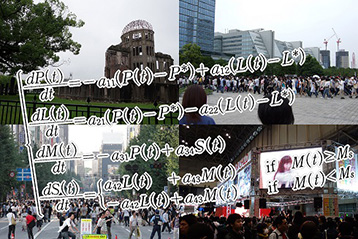 The Atomic Bomb Dome, Akihabara vehicle-free promenade, animated cartoon fair and Comike. Where is social logic (Sociology) going to lead us?
The Atomic Bomb Dome, Akihabara vehicle-free promenade, animated cartoon fair and Comike. Where is social logic (Sociology) going to lead us?
The world where we are living consists of various levels of society, such as district, regional and national, and economic areas, cultural areas and the global society. A wider and more abstract society has a larger diversity and is more complicated. On the other hand, even the tiniest society consists of various kinds of people and groups.
Social diversity means genders, sexualities, races, ethnicities, cultures, religions and ages among groups of people consisting at various level of societies.
Reality is made up of many facets. Features or differences which may not be meaningful for some people, may be meaningful for others. Social diversity can widen people’s thoughts and cultural exchange and be a power source for society. However, it also can cause human rights related problems, such as conflicts for power and social resources, if people create boundaries between themselves.
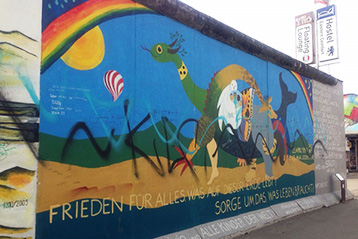 The Berlin Wall remaining today
In modern society where globalization spreads to the four corners of the world, social diversity has become complicated. In addition, because It is changing rapidly, sometimes research exceeding the boundary of individual study fields is necessary.
The Berlin Wall remaining today
In modern society where globalization spreads to the four corners of the world, social diversity has become complicated. In addition, because It is changing rapidly, sometimes research exceeding the boundary of individual study fields is necessary.
 The Berlin Wall remaining today
The Berlin Wall remaining today
What can you study at the Social Diversity Coexistence Course
Social diversity has various facets and entries for study. It is based on the following study fields and in this course, theories and visual analysis of the following fields are flexibly combined.
Social Science
Studying individual’s action, life, thoughts and relationship to “society” as well as “society” exceeding individuals.
Anthropology
Understanding other cultures and cultivating the ability for critical thinking toward one’s taken-for-granted worldview.
Economic (Economic History and Business History)
Researching and analysing drastic economic events and business events which a variety of individuals and corporations have conducted.
Political Thoughts and Gender Studies
Handling freedom and equality in civil society and the classification of public and private, and its development from the history of thought, or as problems of gender or human rights.
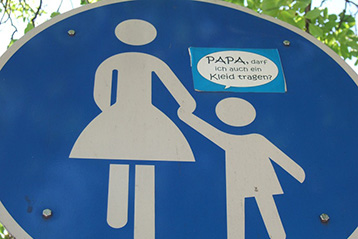 Changing ideas about gender and family. 'Papa, can I wear a girls dress, too?'
Changing ideas about gender and family. 'Papa, can I wear a girls dress, too?'
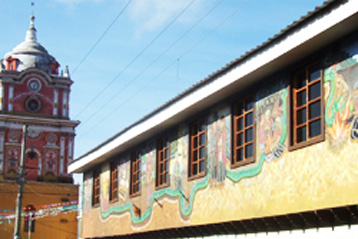 Mural paintings on the wall of the Solola Town Hall
Mural paintings on the wall of the Solola Town Hall
Clarifying subjects and approaches related to the problems of social diversity, through intense study of basic theory and research methodology in each study field. These are independent and professional fields, but their relative points of view are essential. While using the wide view obtained from the course including its sub-courses, I would like students to work on individual and specific research themes.
The qualities required for the study are sensitivity for actual situations and empathy. Therefore, not only reading books and thinking, but going out to the field to learn of people’s views and reviewing the data to find hidden facts and their meanings are also important.
Based on the above, please try to draw theories and future visions which can be the foundation of mutually beneficial coexistence from social diversity, rather than confrontations, conflicts and discriminations, etc.,
Careers after Graduation
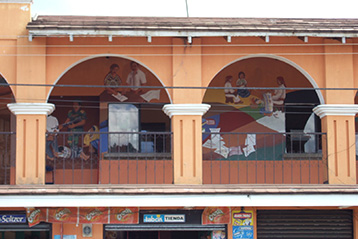 Mural paintings on the wall of Poaquil Town Hall
This course (the Graduate School of Comparative Study of Society and Culture until 2013) has constantly generated holders of doctoral degrees, and most of them work as teachers or researchers at universities in Japan and abroad. In addition, many of the doctor’s and master's degree holders who completed this course have been active in various industrial fields, such as finance, commerce, trade, industry, education and civil services as highly specialized professionals. Not only chasing after the seniors, you can also try to develop new academic positions.
Mural paintings on the wall of Poaquil Town Hall
This course (the Graduate School of Comparative Study of Society and Culture until 2013) has constantly generated holders of doctoral degrees, and most of them work as teachers or researchers at universities in Japan and abroad. In addition, many of the doctor’s and master's degree holders who completed this course have been active in various industrial fields, such as finance, commerce, trade, industry, education and civil services as highly specialized professionals. Not only chasing after the seniors, you can also try to develop new academic positions.
 Mural paintings on the wall of Poaquil Town Hall
Mural paintings on the wall of Poaquil Town Hall
Features of the Course
There are a variety of people from your familiar environment to the back side of the distant planet in the world. And a variety of attributes are given to the individuals and groups that are there. Because a variety of people and groups coexist in society, it is rich and attractive, as well as people are affected by each other and continuously change. At the same time, it causes conflicts, hatred and objections as well as people trying to dominate others. Because social diversity produces a variety of reactions, we are motivated to explore it in order to understand it more deeply.
All of the teachers and graduate students in this course are full of curiosity. Of course, the directions of their curiosity are different, they respect each other’s interests and try to understand the entire diverse society more deeply and precisely from more compelling angles. The biggest attraction of this course is you will be able to know the world more through thorough research.
 Escort ship made by Sumitomo Heavy Industries, Ltd.
Escort ship made by Sumitomo Heavy Industries, Ltd.
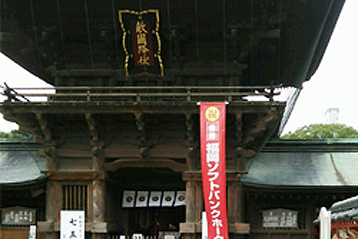 Hakozakigu at the time the SoftBank Hawks claimed victory
Hakozakigu at the time the SoftBank Hawks claimed victory
Faculty List
International Program
| Name | Post | Field of Specialization | Keyword |
|---|---|---|---|
| MISUMI Kazuo | Professor | Sociology | Group processes, Social stratification, Sociological methodology |
| KABURAGI Masahiko | Professor | History of Political Thought | |
| MIYACHI Hidetoshi | Associate Professor | Japanese Economic History, Modern Japanese History | |
| SUGIYAMA Akashi | Associate Professor | Cultural Sociology, Mass Communication Studies | |
| KITAZAWA Mitsuru | Associate Professor | Economic History of Japan | |
| Geerhardt Kornatowski | Associate Professor | Human geography, Urban Sociology, Area studies, Social inequality | |
| LI Xiaoyan | Associate Professor | Knowledge Science Interdisciplinary Education and Research Second-language Acquisition | Knowledge Co-creation Interdisciplinary Education and Research Intercultural Communication and Multi-cultural Group Work |
| FUJITA Tomoko | Lecturer | Family Sociology, Gender Studies, Australian Studies | |
| FURUKAWA Fukachi | Lecturer | ||
| GENKA Tohru | Lecturer | ||
| KURITA Kenichi | Lecturer | Economics, Applied Data Science | Applied Microeconomics, Policy Analysis |
| Assistant Professor |